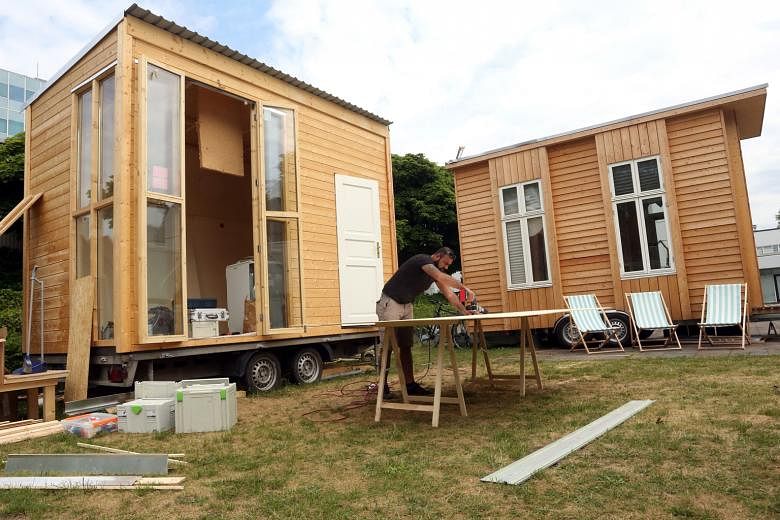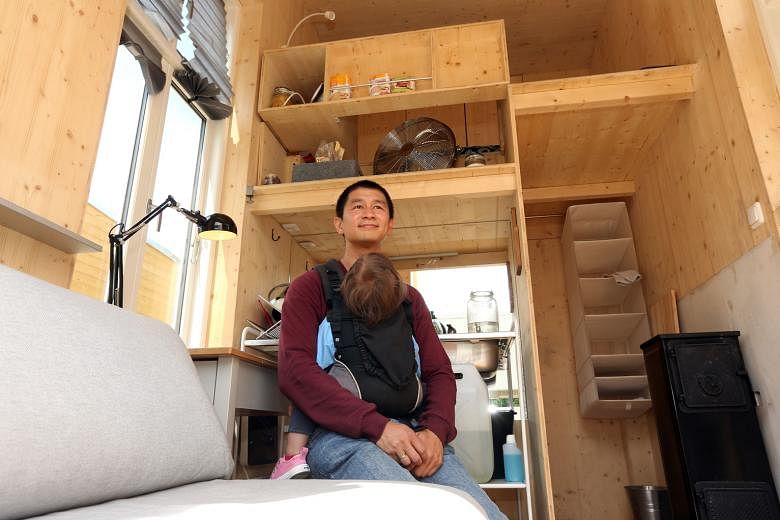BERLIN •Troubled to see a long queue of asylum seekers shivering for hours on a winter's day outside Berlin's notoriously chaotic registration centre, Mr Van Bo Le- Mentzel decided to take action.
"I fetched my drill and collected some wood that I found randomly in the streets and took it to the line where people were standing there, bored to death, and we just started building," the architect said.
The end products were pint-sized playhouses that children could crawl into for shelter and break up the monotony of the endless wait.
It also marked the birth of Tiny House University, a project bringing together architects and designers to experiment with innovative ways to house a population in need.
"We are trying to create new kinds of housing forms in society in which it's possible to live and survive without having land or money," said Mr Le-Mentzel.
The tiny house trend emerged several years ago, largely in the United States, as people chose to downsize their living space out of environmental or financial concerns.
In Berlin, it has been given a twist for contemporary needs.
Mr Le-Mentzel's team, which includes six refugees, is collaborating with the Bauhaus Archiv Museum of Design to build 20 tiny houses occupying 10 sq m each. They will form a village on exhibition until March next year.
Some will serve as lodgings while others are destined to be a library, cafe or community centre.
Each building is fitted on wheels and can be parked on a road as a form of trailer.
"In Berlin, we have 1.5 million cars registered and they are all standing in the streets overnight, not in use. Each car is about 10 sq m," he noted.
"So I'm asking what would happen if we just replace these 1.5 million cars with tiny houses, with mobile playgrounds for kids or with open spaces where neighbours can cook together, find company together, where refugees can create a start-up in the streets - opening a restaurant, (giving) a haircut."
He views his Tiny100 as a prototype for small apartments which can be let out for €100 (S$160) a month to low-wage earners.
His ultimate goal is to fit out a building with not only regular- sized apartments, but also compact homes, allowing the "rich and poor" to live together.
"It will be a house that mirrors society," he said. Talks are ongoing with "three or four investors" about making his dream come true.
In a warehouse area in southern Berlin, another member of the team, Mr Noam Goldstein, is fitting insulation into one of the 20 tiny houses.
His version of the small home would feature not just the usual trappings of an apartment, but also solar panels, a compost toilet and a hydroponics garden.
The carpenter expects material cost for the house to run between €12,000 and €15,000.
While some components such as windows have to be purchased, he said much of the wood used is recycled pallet wood.
"When you look at the financial aspect, it provides a very cheap way for people to build their own house," said Mr Goldstein.
Researcher Amelie Salameh, who was among the initial ones to try out the first of the 20 tiny houses overnight, is a convert.
Measuring just 6 sq m, the first tiny house built by Mr Le-Mentzel himself for the project is a selfcontained unit with a living room, kitchen, sleeping area, toilet and shower.
"The way it was designed, there were mirrors and a lot of light. I never felt trapped inside," said Ms Salameh, who lived in the house for three weeks.
She even had two friends sleep over for a night and once hosted a visit of 13 people.
"We had a few beers, it was fun," she said, adding that "you just have to think about where you're putting your stuff and to tidy up constantly, because the place gets full quickly."
AGENCE FRANCE-PRESSE


